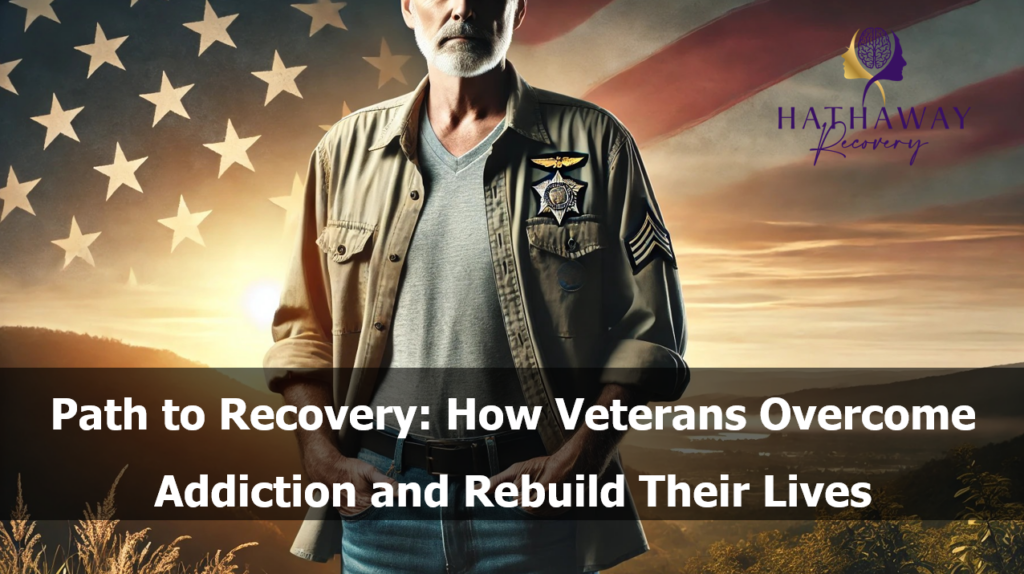Addiction is a pressing issue among veterans, affecting many as they transition from military service to civilian life. This period can be fraught with psychological and emotional challenges, leading some veterans to turn to substance abuse. However, with the right support and resources, veterans can overcome addiction and rebuild their lives. This article explores the factors contributing to addiction in veterans, the resources available, and inspiring success stories of veterans who have triumphed over their struggles.

The Challenge of Transition
The shift from military to civilian life can be overwhelming, often accompanied by several significant challenges. Post-Traumatic Stress Disorder (PTSD) is common among veterans, manifesting as anxiety, flashbacks, and depression due to service experiences. This often leads to self-medication with drugs or alcohol. Chronic pain from service-related injuries is another factor, frequently resulting in the misuse of prescription painkillers.
Additionally, social isolation plays a critical role. Many veterans feel disconnected from their civilian peers, leading to loneliness and depression, which can contribute to substance abuse. These challenges highlight the need for targeted support and intervention to help veterans navigate this difficult transition.
Prevalence of Substance Abuse Among Veterans
– Alcohol Use Disorder: Approximately 1 in 4 veterans report binge drinking, with higher rates among those with PTSD.
– Prescription Drug Misuse: Nearly 11% of veterans have misused prescription drugs, primarily opioids, due to chronic pain.
– Illicit Drug Use: About 3% of veterans report using illicit drugs, with cannabis being the most commonly used.
PTSD and Addiction
– PTSD Prevalence: Around 11-20% of veterans who served in Operations Iraqi Freedom (OIF) and Enduring Freedom (OEF) have PTSD.
– Co-occurring Disorders: Veterans with PTSD are 2-4 times more likely to have substance use disorders than those without PTSD.
Treatment and Recovery:
– VA Substance Abuse Treatment Programs:** The VA reports that over 40,000 veterans receive substance abuse treatment annually.
– Success Rates: Veterans who participate in VA treatment programs have higher recovery rates, with over 60% reporting significant improvement.
Economic Impact
– Cost of Addiction: Substance abuse among veterans costs the VA over $1 billion annually in treatment and related healthcare expenses.
– Employment and Productivity: Veterans with untreated addiction issues are more likely to experience unemployment and reduced productivity, further impacting their reintegration into civilian life.
These statistics underscore the urgent need for comprehensive support systems tailored to the unique challenges faced by veterans struggling with addiction.
Available Resources for Veterans
Recognizing the unique needs of veterans, several organizations provide specialized support to help them manage addiction. The Department of Veterans Affairs (VA) offers comprehensive substance abuse treatment programs, including inpatient and outpatient services, counseling, and medication-assisted treatment. These programs are tailored to address the specific challenges faced by veterans.
Veterans Treatment Courts provide an alternative to incarceration for veterans charged with non-violent offenses, focusing on rehabilitation instead. Peer support groups, such as those offered by the Veterans of Foreign Wars (VFW) and American Legion, provide a platform for veterans to share experiences and support each other’s recovery. These resources are vital in helping veterans overcome addiction and build healthier lives.
Stories of Triumph
The success stories of veterans who have managed their addiction are powerful examples of resilience and hope. After serving in Iraq, John struggled with PTSD and alcohol abuse. With the help of the VA’s counseling services and a supportive peer group, John has been sober for five years. He now mentors other veterans, guiding them on their recovery journeys.
Similarly, Maria, injured in Afghanistan, became dependent on prescription painkillers. Through the Veterans Treatment Court program, she received treatment instead of jail time. Today, Maria is pain-free and pursuing a degree in social work to help others facing similar challenges. These stories exemplify the potential for recovery and renewal among veterans.
Managing addiction is a lifelong journey, but veterans are not alone. With access to the right resources and a supportive community, they can overcome addiction and build fulfilling lives. Society owes it to these brave individuals to provide the support they need, recognizing their sacrifices and honoring their resilience.
With a Promise of a New Beginning
For those struggling with addiction, Hathaway Recovery offers a beacon of hope. Their dedication to renewing and rebuilding lives is evident in their comprehensive approach to treatment and care. With a promise of a new beginning, Hathaway Recovery extends its helping hand to those in need. Their Admission Department provides confidential assistance and can be reached at (909) 971-3333, offering a pathway to recovery and a chance to embark on a transformative journey towards a healthier, fulfilling life.
The integration of personalized care, as exemplified by Hathaway Recovery, with an understanding of the social determinants of health, represents the future of effective addiction treatment. It’s a holistic approach that addresses not only the clinical aspects of addiction but also the environmental and personal factors that influence each individual’s path to recovery. By combining these elements, addiction treatment becomes more than a medical intervention; it becomes a journey toward personal empowerment and a new beginning.






